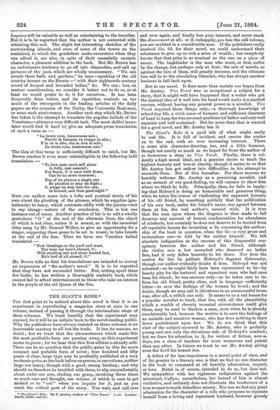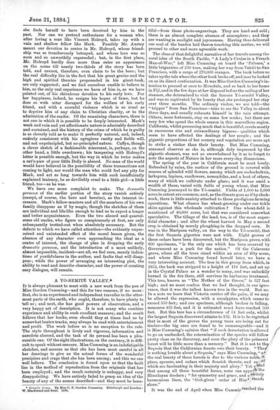THE GIANT'S ROBE.* THE first point to be noticed about
this novel is that it is an .experiment in reproducing a magazine story at once in one volume, instead of passing it through the intermediate stage of three volumes. We trust heartily that the experiment may succeed, for it will be an infinite boon to the novel-reading public. Why the publishers have always insisted on three volumes is an inscrutable mystery to all but the trade. It has its reasons, no doubt; but we trust that the circumstances which made this the most profitable form are passing away, as this experiment seems to prove ; for we hear that this first edition is already sold. There can be no question that the public gains by this far more compact and portable form of novel ; four hundred and fifty pages of clear, large type may be profitably published at a very moderate price, as the book before us proves, in one volume, neither large nor heavy, though with a good, strong binding; and why should we therefore be troubled with three, to slip uncomfortably about under our arm, eluding our grasp, involving three times as much care and thought, one volume of which is sure to get mislaid or be "out" when you inquire for it, just as you reach the critical part of the story. You wait, and call over
• The Giant's Robe. By F. Anstey, Author of " Vice Versa.° 1 vol. London : smith, Elder, and Co. and over again, and finally lose your interest, and never reach the denouement at all; or if, unhappily, you lose the odd volume, you are mulcted in a considerable sum. If the publishers really received 31s. 6d. for their novel, we could understand their reluctance to give up so rich a mine of wealth ; but everybody knows that that price is as nominal as the one on a piece of music. The bogkbinder is the man who must, at first, suffer by the change, but perhaps only at first; the sale of novels, as against the hire of them, will greatly increase, and the ultimate loss will be to the circulating librarian, who has always another business to fall back upon.
But to our novel. It does more than sustain our hopes from Mr. Anstey. Vice Versa was so exceptional a subject for a story, that it might well have happened that a writer who got the comical idea of it well into his head would make it a marked success, without having any general power as a novelist. Vice Versa" required three things only,—a thorough knowledge of school-boy life, a vivid sense of humour, and sufficient clearness of head to keep the two reversed positions (of father and son) well separate and well sustained. But far more than that is wanted for a good novel, and Mr. Anstey has it.
The Giant's Robe is a good tale of what might easily be real life. It is fall of incident, and carries the reader on to the end, with an ever increasing interest. There is some able character-drawing, too, and a little humour, though not nearly as much as we hoped for from the author of so humorous a story as Vice Versa. Finally, there is evi- dently a high moral ideal, and a genuine desire to teach the highest honesty and truest charity, though it seems to us that Mr. Anstey has got rather into difficulties in his attempt to reconcile them. But of this hereafter. For these reasons we heartily welcome Mr. Anstey as a promising novelist, and as an earnest of our good-feeling, we will venture to show him where we think he fails. Principally, then, he fails in imply- ing that Holroyd is doing an honourable and generous thing, when he takes the course of vindicating the apparent honesty of his old friend, by asserting publicly that the publication of his own book, under his friend's name, was agreed between them at his, the real author's, earnest wish. It is true that the man upon whom the disgrace is -thus made to fall deserves any amount of honest condemnation for abundance of misdeeds, but certainly he does not deserve to be hooted from all reputable houses for inventing a lie concerning the author- ship of the book in question, when the lie—a very gross and tremendous one—is told by the author himself. We felt
absolute indignation at the success of this disgraceful con- spiracy between the author and his friend, although the victim was a low scoundrel who deserved no better
fate, had it only fallen honestly to his share. Nor does the motive for the lie palliate Holroyd's flagrant dishonesty, though our author evidently thinks it does. Holroyd was not actuated—as he might fairly have been represented to be—by hearty pity for the tortured and repentant man who had once been his friend; he was anxious only—as he takes care to in- form his old friend, pretty often, and in language sufficiently bitter—to save the feelings of the woman he loved; and the desire, though we may call it chivalrous in an unsuccessful lover, was, after all, a selfish one only. It seems to us a sad lesson for a popular novelist to teach, that lies, with all the plausibility which a wealth of cleverly invented circumstance could give them, may be used to blacken a man, even when he is already irreclaimably bad, because the motive is to save the feelings of an amiable and sensitive woman, who has done nothing to draw down punishment upon her. We do not think that this view of the subject occurred to Mr. Anstey, who is probably young and saw only the chivalrous aide of Holroyd's conduct; but we draw his attention to it, for writers of fiction, now-a- days, are a class of teachers far more numerous and potent than any other. In future we trust to see Mr. Anstey giving even the devil his honest due.
A defect of far less importance in a moral point of view, and of far greater in a literary one, is that we find no one character in the book to command at all heartily admiration, respect, or love. Mabel is, of course, intended to do so, but does not. We sympathise with her righteous indignation against the miscreant, Caffyn; nevertheless, her hatred of him is almost vindictive, and certainly does not illustrate the tenderness of a true woman towards friendless misery. Nor can we feel any great admiration for the character of a wife who proposes to separate herself from a loving and repentant husband, however grossly she finds herself to have been deceived by him in the past. Nor can we pretend enthusiasm for a woman who, after loving a man like Vincent Holroyd, takes up with a vain and shallow fellow like Mark. Possibly Mr. Anstey meant our devotion to centre in Mr. Holroyd, whose friend- ship was so treacherously betrayed, and whose love was so soon and so unworthily superseded ; but, in the first place, Mr. Holroyd hardly does more than enter an appearance on the scene till nearly two-thirds of the story has been told, and cannot, therefore, even claim to be the hero ; but the real difficulty lies in the fact that his great genius and the high and spirited theories propounded in his giant-book, are only suggested; and we find ourselves unable to believe in him, as the only real experience we have of him is, as we have pointed out, of his chivalrous devotion to his early love. For her happiness, indeed, he resigns his hopes of fame, but he does so with utter disregard for the welfare of his early friend, and with a scornful violence which is so cruel as to deprive him of any claim to Christian charity, or to the admiration of the reader. Of the remaining characters, there is not one in which it is possible to be deeply interested. Mark's weak and vain and yet affectionate nature is admirably described and sustained, and the history of the crime of which he is guilty is so cleverly told as to make it perfectly natural, and, indeed, entirely consistent with his egregious vanity and feeble will, and not unprincipled, but no-principled nature. Caffyn, though a clever sketch of a fashionable miscreant, is, perhaps, on the other hand, a little overdrawn ; his tampering with Holroyd's letter is possible enough, but the way in which he twice makes a cat's-paw of poor little Dolly is absurd. No man of the world would have believed in the possibility of these transactions not coming to light, nor would the man who could feel any pity for Mark, and act so long towards him with such insufficiently explained leniency, be so devilishly cruel to a little girl—a little friend, too—as he was.
We have one more complaint to make. The dramatis persona; of the earlier portion of the story vanish entirely (except, of course, the hero and heroine), as the interest in- creases. Mark's fellow-masters and all the members of his own family disappear as if by magic, though the sketches of them are individual and life-like enough to lead us to expect a longer and better acquaintance. Even the two absurd and quarrel- some old uncles, who figure so conspicuously at first, are only subsequently trotted-out when absolutely necessary. But the -defects to which we have called attention—the evidently unper- ceived and unintended effect of the moral lesson given, the absence of any character even approaching the ideal as a centre of interest, the change of plan in dropping the early dramatis personae, and the introduction of a most unlikely, alniost impossible, incident—are all, we feel sure, merely indica- tions of youthfulness in the author, and faults that will disap- pear; while the power of arranging an interesting plot, the ability to read and describe character, and the power of creating easy dialogue, will remain.



































 Previous page
Previous page